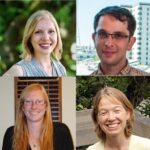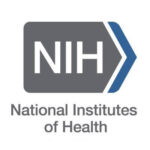CSDE Welcomes Four More Faculty Affiliates!
|
CSDE’s Executive Committee is pleased to introduce four of our new UW Faculty Affiliates:
- Abraham Flaxman – Associate Professor, Health Metrics Science and Global Health. Flaxman is currently leading the development of new methods for cost effective analysis with microsimulation and is engaged in methodological and operational research on verbal autopsy. He has previously designed software tools such as DisMod-MR that IHME uses to estimate the Global Burden of Disease, and the Bednet Stock-and-Flow Model, which has produced estimates of insecticide-treated net coverage in sub-Saharan Africa.
- Laina Mercer - Sr. Program Officer - Statistician, PATH. Mercer handles design, analysis, and statistical oversight of Phase I-IV studies supporting vaccine development, and provides technical assistance and statistical consulting to groups across PATH including Medical Devices and Health Technologies, Noncommunicable Diseases, Malaria Elimination, and others.
- Julie Morris - Director of the Center for Social Science Instruction, Sociology, Western Washington University. Morris’ research interests are in statistics, demography, and social determinants of health and medicalization; specifically as they relate to stress, health behaviors, and mental health outcomes.
- Sarah Stone - Executive Director, eScience Institute, University of Washington. Stone handles eScience operations and planning, develops research and training programs, participates in strategic planning, and serves as the primary contact for university and industry partners, funding agencies and the public. Stone also serves on CSDE’s Executive Committee.
(read more)
|
 |
West Coast Poverty Center Webinar on Poverty and Hardship in WA State
The UW’s West Coast Poverty Center is hosting a webinar on “Poverty and Hardship in Washington State: A Mid-Pandemic Update” on January 7th at 9:30am-11am. The presentations will include up-to-date estimates on poverty and material hardship in Washington State, followed by a discussion about how these trends are playing out across the state. Panelists will consider how policies and programs have responded to Washingtonians’ increased needs and what further measures are needed. Panelists include:
- Zach Parolin, Research Scientist, Columbia University
- Lori Pfingst, Senior Director, Economic Services Administration, Washington State Department of Social and Health Services
- Drayton Jackson, Co-Chair, Governor Inslee’s Poverty Reduction Work Group
- Vanessa Gaston, Director at Clark County Community Services and Board Chair, Washington State Community Action Partnership
- Moderator: Jennie Romich, Professor, University of Washington/WCPC
For details and registration, please visit the webinar link. (read more)
*New* Mixed Methods Research Training in Health Sciences Summer Retreat for PhD Investigators
Johns Hopkins is hosting a Mixed Methods Research Training Program for the Health Sciences this summer. It is funded by the NIH Office of Behavioral and Social Science Research (OBSSR) and it has been a well-received program with documented evidence of its impact. The deadline for applications is January 19, 2021. For details, see here.
(read more)
Interested in Understanding COVID Vaccine Timetables and Pipelines?
|
The Center for Health Journalism at USC’s Annenberg School is hosting a webinar on Jan. 14 with Lisa Krieger (Science and Medicine reporter for The San Jose Mercury News) to to pull back the veil on the vaccine pipeline and help with better understanding the distribution system at the national, state and county levels. For researchers this might be a good way to start to anticipate prospective study designs. More information at this link.
(read more)
|
 |
*New* Call for Applications: CSDE Seed Grants
|
CSDE is announcing another round of seed grant support for our affiliates. More information and a link to the submission page can be found at: https://csde.washington.edu/research/csde-seed-grants/. The application deadline for Tier 2 and 3 applications is Jan 15, 2021. Tier 1 applications are accepted on a rolling basis. We are especially eager for applications that might lead to ongoing collaboration between affiliates and CSDE staff, and for applications that include collaborations with CSDE graduate student trainees, proposing to support their trainee experience through RA opportunities or postdoctoral funding. We are also especially interested in applications that fit into any of the many research programs of NIH’s Population Dynamics Bureau (PDB).
(read more)
|
 |
*NEW* NIH Mid-Career Award (K18) Due March 17, 2021
|
This Funding Opportunity Announcement (FOA) invites applications from investigators who strive to expand their research trajectories through the acquisition of new knowledge and skills in the areas of basic psychological processes, sociological processes, and/or biomedical pathways—expertise that is beyond and enhances their current areas of expertise. The program will support career development experiences and a small-scale research project that will provide experienced investigators with the scientific competencies required to conduct independent research projects that more thoroughly investigate interrelationships among behavioral, biological, endocrine, epigenetic, immune, inflammatory, neurological, psychological, and/or social processes. Applicants may propose research that involves non-human animals, secondary data analyses, or other career development projects that do not involve leading an independent clinical trial, a clinical trial feasibility study, or an ancillary study to a clinical trial. CSDE is always happy to help you in the preparation of your applications - whether that is with scientific consultations or pre-award proposal support, which includes budget preparation, all ancillary materials, management of submission, and experienced reviewers for providing feedback on your narrative. Contact Scott Kelly, Sara Curran, Steve Goodreau, or Belinda Sachs with any questions.
(read more)
|
 |
*NEW* One-year Pilot Grants from HEADS Center for Economics of Alzheimer’s Research
The Hopkins’ Economics of Alzheimer’s Disease & Services (HEADS) Center invites applications for pilot grants related to two themes: (1) identifying and quantifying the range of care needs of persons with ADRD and the economic consequences of ADRD for patients and families; (2) examinations of how the organization, financing, and delivery of services affects accessibility, affordability, quality, and equity of ADRD care. The deadline for applications is February 1, 2021. For details, see here.
(read more)
*NEW* 2020 IPUMS Research Award Deadline Approaching
The deadline for the 2020 IPUMS Research Award is Feb. 12, 2021. If you’ve used IPUMS data in your research consider submitting your paper for consideration in one of six categories: US Microdata, International, Health Surveys, Spatial, Global Health, or Time Use. Twelve awards will be given for best published work and best graduate student work (published or unpublished). For details, visit the award page.
(read more)
CSDE Affiliates Plan NOW for an NIH Population Dynamics Branch Research Application!
Calling all UW demographers, population scientists, and population health scientists. CSDE strongly encourages you to consider preparing applications (larger ones (R01) or smaller ones (R21/R03) or career awards (K’s) or conference grants (R13s) or small training workshops (R25)) to the Population Dynamics Branch! The Population Dynamics Branch has a broad social science mandate that includes research, data collection, and research training in demography, reproductive health, and population health. Any research captured by CSDE’s Primary Research Areas is eligible, including: Population and Environment, Migrations and Settlements, Health of People and Populations, Demographic Methods and Measurements, Wellbeing of Families and Households. Upcoming due dates are the standard ones for NIH, which are primarily in early to mid February. The scientific review panels for PDB are comprised of social scientists, demographers, and reproductive health scientists. There are typically two panels where your research proposal will be sent, including SSPA and SSPB. Contact CSDE for more details about your applications. We’re happy to support your applications, including offering mock reviews!(read more)
|

